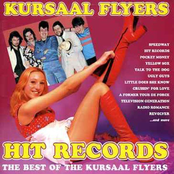Hit Records

Biography
The Kursaal Flyers From Wikipedia, the free encyclopedia This article needs additional citations for verification. Please help improve this article by adding reliable references. Unsourced material may be challenged and removed. (March 2008) The Kursaal Flyers were a British pop and country music band, formed in Southend-on-Sea in 1973, who "bridged the gap between pub rock and power pop".[1] Contents * 1 Original members * 2 Career * 3 See also * 4 References * 5 External...
The Kursaal Flyers From Wikipedia, the free encyclopedia This article needs additional citations for verification. Please help improve this article by adding reliable references. Unsourced material may be challenged and removed. (March 2008) The Kursaal Flyers were a British pop and country music band, formed in Southend-on-Sea in 1973, who "bridged the gap between pub rock and power pop".[1] Contents * 1 Original members * 2 Career * 3 See also * 4 References * 5 External links Original members * Paul Shuttleworth (born 24 December 1947, London), vocals * Richie Bull (born 23 October 1948, Corringham, Essex), banjo * Graeme Douglas (born 22 January 1950, Rochford, Essex), lead guitar, later replaced by Barry Martin * Will Birch (born 12 September 1948, London), drums * Vic Collins (born 10 September 1950, Rochford), pedal steel guitar * Dave Hatfield, bass guitar (left in 1974) Career The group formed when Shuttleworth, Douglas, Birch, Collins, Bull and Hatfield, who had all performed locally in various combinations around Southend, got together in late 1973 to form a new band. They made their first appearance together as The Kursaal Flyers - named after a local ballroom - in February 1974, mainly playing covers of country rock songs but over time increasingly writing their own material. Through contacts in the band Dr. Feelgood, they then got some support slots in London, where they were seen by influential agents and songwriters. All bar Hatfield turned professional at the start of 1975, signed for Jonathan King's UK Records, and released their first album Chocs Away. Although the singles "Speedway" and "Hit Records" received some airplay, the band's second album, The Great Artiste, sold poorly. Nevertheless the band developed a solid live reputation on the London pub rock scene, with an eclectic mixture of original material and cover versions, fronted by Paul Shuttleworth's "wide boy" persona. In 1976 they signed with the CBS label, and recorded the album The Golden Mile with record producer, Mike Batt. One of their songs, "Little Does She Know", was singled out by Batt for an over-the-top Phil Spector style production. In addition, the band's then manager, Paul Conroy, had the band perform on BBC Television's Top of the Pops surrounded by laundry machines and giant detergent boxes. [2] It soon reached #14 on the UK Singles Chart.[3] However, Graeme Douglas was concerned about the over-commercialisation of the group's music and left to join Eddie and the Hot Rods, being replaced by Barry Martin. The group toured widely and issued two more albums, Golden Mile and Five Live Kursaals, but, with the growth of punk rock and numerous personnel changes, the band disintegrated in late 1977. Following the Kursaals' demise, Shuttleworth released several solo records, Douglas enjoyed success with Eddie and the Hot Rods, and Birch formed The Records. The group reformed for tours in 1985 and 1988, and in 2001 reformed on a more permanent basis. http://www.kursaalflyers.net/home.php Read more on Last.fm. User-contributed text is available under the Creative Commons By-SA License; additional terms may apply.


